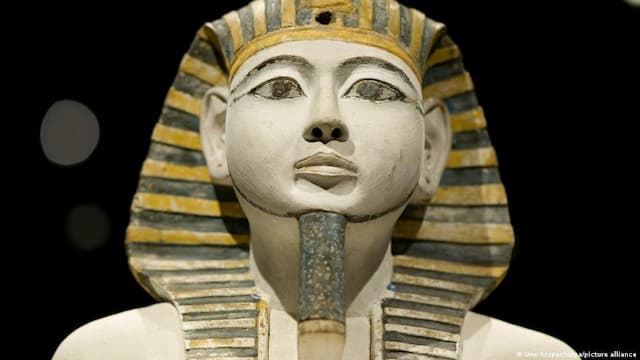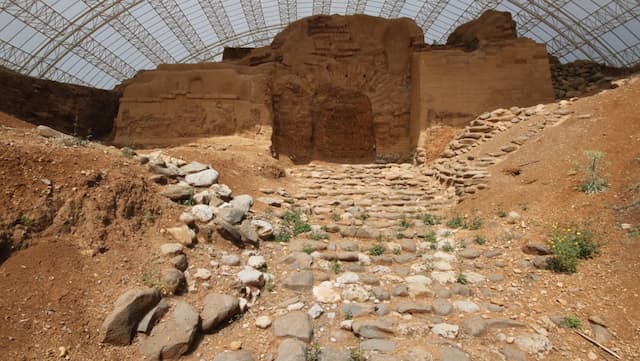The Gospel in Romans

Open Romans.
What was Paul’s gospel? A survey of how he uses gospel in Romans could give an indication.
Previously, we summarized the gospel, tracing its roots in Isaiah, through Mark’s Gospel and Peter’s preaching, to the eternal gospel of Revelation. But was this Paul’s gospel?
The word gospel (noun or verb) occurs twelve times in Romans, clustering around the opening and closing chapters like a framework. Let’s check it out.
Opening chapters (Romans 1–2)
1:1-4. Paul is a slave of Messiah Jesus, called as an emissary with the commission of God’s gospel (1:1). What is God’s gospel?
God’s gospel was previously promised through is prophets in Scripture (1:2). God’s gospel is a statement about his Son, a physical descendant of King David (1:3). God’s gospel appoints his Son to power, and God made this appointment by his cleansing breath/Spirit raising up Messiah Jesus from the dead as our Lord (1:4).
Paul’s gospel is God’s good decree that his Son is our Lord.
1:9-11. The appropriate response to God’s gospel of his Son is to serve (1:9). This serving is a mediatorial role between the heavenly sovereign and his people on earth. Paul approaches the throne on behalf of the people (1:10), and he brings the sovereign’s gifts to strengthen his people to care for each other as they trust his leadership (1:11-12).
The gospel of the Son’s appointment as our Lord means we are in the service of his Father.
1:15-16. Commissioned by God’s gospel, Paul feels the responsibility of declaring the good news of this change in global leadership to all people, including Rome (1:14-15). Now, that’s a scary commission: we’re talking about the heart of the empire that crucified God’s Christ rather than recognize his authority!
But even in the city designed to declare imperial might, Paul is not ashamed of the gospel proclamation that Jesus reigns. He’s not ashamed because God’s gospel is the proclamation of the power of God, the good news that God’s reign is returning to earth. The consequence of God’s reign returning is global rescue — salvation from the oppressive powers that have divided and subjugated the peoples of the world (1:16a).
Since God’s good proclamation made his Christ the Lord of all, deliverance comes to all who trust the leader God appointed, giving him their allegiance. This message came first to those who were already God’s nation as a result of the Sinai covenant, but God’s gospel proclamation that his Son is Lord of all extends that deliverance to all nations (1:16b).
Salvation is not the gospel. Salvation is a consequence of the gospel. The global rescue is in process because God has appointed his Son as Lord of all.
2:16. Since God’s gospel gives global authority to his Son, a day will come when God evaluates whether people are living faithfully under King Jesus. We cannot judge each other, but according to my gospel God will evaluate people’s secrets on the basis of [their allegiance to] King Jesus.
Paul’s gospel echoes God’s gospel. God’s gospel proclaims Jesus Christ as Lord. The gospel of King Jesus is the basis for evaluating everyone, but God alone can make that evaluation.
Intermediate chapters (Romans 3–14)
Inside the bookends (Romans 1–2 and 15–16), gospel is rare in Romans.
10:15-16. How beautiful are the feet of those who make the gospel proclamation. This is a quotation from Isaiah 52:7, where the content of the gospel proclamation to Zion is this: “Your God reigns!”
But not everyone in Zion accepted the proclamation. When the crowds recognized David’s descendant returning to Jerusalem as the prophets had promised, the leaders refused to recognize his authority (Matthew 21:23-27). In fact, the whole of Matthew 21–25 is devoted to calling the Jerusalem leaders to recognize the Son’s authority to reign. Instead, his own people handed him over to their enemies to be crucified.
Paul is deeply grieved that they did not trust the leader God appointed for his people (Romans 9:2), but he is not surprised. Isaiah anticipated this rejection: Who has believed our message? (10:16, quoting Isaiah 53:1) From this Paul concludes that people must hear God’s gospel proclamation about his Messiah if they are to trust his leadership (10:17).
So here’s the question that occupies Paul’s life. Given that God’s gospel proclaimed global authority for his Son, how will the whole world hear what God proclaimed, so the nations can submit to the gospel proclamation? (10:16)
11:28. Conflict between Jews and gentiles is the major pastoral issue in the church in Rome. Even if they treat you as enemies on account of the gospel, you must treat them as beloved and chosen by God because of his promises to the patriarchs. Let’s unpack that.
Enmity between God’s nation and the nations permeated Israel’s history: Joshua’s wars, David’s battles, Assyria’s invasion, Nebuchadnezzar taking it all, the Persian threat in Esther’s time, Antiochus’ Hellenization programme in Maccabees, Roman invasion in the century before Christ. They yearned for God to save his people by wreaking vengeance on nations, as expressed in their apocalyptic stories.
The newest threat to Judaism came from those who claimed that the Messiah was a crucified man whom God had raised up to unite Jews and gentiles as one people under God, without requiring all people to live by the founding covenant God had given his people at Sinai. Paul himself had been an enemy of this “gospel” … until he met the King on the road to Damascus. Paul understood why they (Jews who did not believe this gospel) would treat you (gentiles who did) as enemies because of the gospel.
But gentiles who believe the gospel of Christ cannot treat Jews as enemies. God chose them as his nation. God loved them as his family because of the promises he made to the patriarchs (11:28, compare Exodus 2:24).
Caesar may have thrown the Jews out of Rome in the AD 40s, but God is not like that. God had not rejected the Jews and replaced with a gentile church: the gifts and calling of God are irrevocable (11:29).
God’s gospel raised up his Christ as Lord of all, so Jews and gentiles are now one people under one leader, so that he may have mercy on all (11:32). God’s gospel is the ultimate resolution of the old Jew/gentile divide.
That’s why God’s gospel demands the church in Rome learn to live as a unified family where no one sacrifices others but everyone offers their own body to God in worship (12:1), serving the community (12:3-8) in genuine love that that does not rely on vengeance for justice (12:9-21), etc. The whole of Romans 12–16 calls Jews and gentiles to live together as God’s family in trusting obedience to God’s Christ, as required by God’s gospel.
Closing chapters (Romans 15–16)
The last two chapters of Romans echo the gospel as defined in the first two.
15:15-21. As a Jew called to echo God’s gospel call for gentiles to submit to the authority of God’s anointed, Paul serves as a priest mediating between the heavenly king and his earthly realm. God’s gospel logically calls everyone — even gentiles — to serve like this (Romans 12:1). And within that global commission, Paul’s particular calling is to be a priest-servant of King Jesus to the nations in the service of God’s gospel (15:16).
What Paul is proud of (15:17) is what the Messiah has accomplished through me towards the goal of bringing the nations into submission to the Messiah in word and deed (15:18). The nations submit in word when they declare with their mouth that Jesus is Lord because God raised him from the dead (Romans 10:9). The nations submit in deed when they serve God and each other with genuine love, trusting God for justice (Romans 12).
So, here’s what Paul is proud of: From Jerusalem all the way round to Illyricum I have fulfilled the gospel of the Messiah (15:19). Illyricum is on the northwest coast of Macedonia (Albania today), just across the Adriatic Sea from Italy. It’s 1000 miles from Jerusalem by air, more than 2000 kilometres by road!
What an astounding achievement! Paul really does believe God’s gospel of his Christ, God’s proclamation that God’s anointed is Lord of all the peoples of the earth.
This was his life-goal: to make the gospel announcement where Christ has not been named (15:20). God’s Christ is the only foundation on which the restored world can be built. Christ’s kingship is the hope of a world no longer at war, a world where the nations submit to the reign of God’s anointed. There is no other foundation on which to build than the gospel of the Christ (15:20).
16:25. The letter’s closing doxology honours the God Paul serves, the one who has the power to sustain you in accordance with my gospel, that is the announcement of Jesus as the Messiah.
The opening verses of the letter defined God’s gospel as his proclamation that his Son was installed to reign by raising him from the dead. Paul’s gospel echoes that proclamation that that Jesus is the anointed ruler whom God has placed over all peoples.
This solution to earth’s conflicts was not always obvious. How God would save his people and judge the stream of nations who had regularly oppressed them was a mystery.
But the mystery has been revealed now that God has proclaimed his Messiah as Lord of all. Despite the apocalyptic expectations, God never planned to destroy the nations. He had always planned to rescue the nations as well as his own nation by bringing us all together under Christ as Lord. What a solution!
This solution has been disclosed now that Christ has been raised up and given all authority. It was there all along in the prophetic writings. Our eternal sovereign had always planned for the trusting obedience for all the nations (16:26).
God’s gospel proclamation that his Christ is Lord of all reveals the wisdom of the God who has always ruled. To the only wise God [who reigns and receives honour] through Messiah Jesus be enduring splendour. May it be so! (16:27)
Conclusion
Romans addresses many important themes, and they’re all framed within the gospel.
Everything else finds its place within God’s gospel announcement that he has raised up his Son as Lord of all peoples, bringing all nations to trusting submission in him.
That’s the gospel in Romans.
What others are saying
Joel Willitts, “Paul and Matthew: A Descriptive Approach from a Post-New Perspective Interpretative Framework,” in Paul and the Gospels: Christologies, Conflicts and Convergences, LNTS (London: Bloomsbury, 2013), 74–75:
Paul’s opening to Romans (1:1–6) affords him the opportunity to explain the gospel he proclaims in the briefest of terms. It is in the delineation of the ‘gospel of God’ (1:1) that Paul refers to Jesus’ Davidic ancestry. Jesus’ identity as the son of David is a central element of the gospel Paul proclaims and fundamental to his apostolic commission to the Gentiles. In declaring that the gospel of God is about God’s Son, Paul defines the term with three assertions. First, Paul states God’s Son means a descendant of David (ἐκ σπέρματος Δαυὶδ κατὰ σάρκα) according to the Scriptures (1:3). Second, Paul states the Davidic son has been ‘installed’ (ὁρισθέντος) Son of God, ruler of the world, on the basis of the resurrection (1:4). Third, Paul states that the enthroned Messiah, then, is the authority behind his apostleship to the nations in order to bring about the ‘obedience of faith’ among them (1:5–6). Jesus’ sonship, then, involves his Davidic ancestry, his heavenly enthronement and his authority to commission Paul’s apostolic work among the Gentiles. All three points, when considered against the backdrop of Davidic promise tradition, reveal the significance of Davidic Messianism for Paul’s theology and mission.
Related posts
Seeking to understand Jesus in the terms he chose to describe himself: son of man (his identity), and kingdom of God (his mission). Riverview Church, Perth, Western Australia
View all posts by Allen Browne











